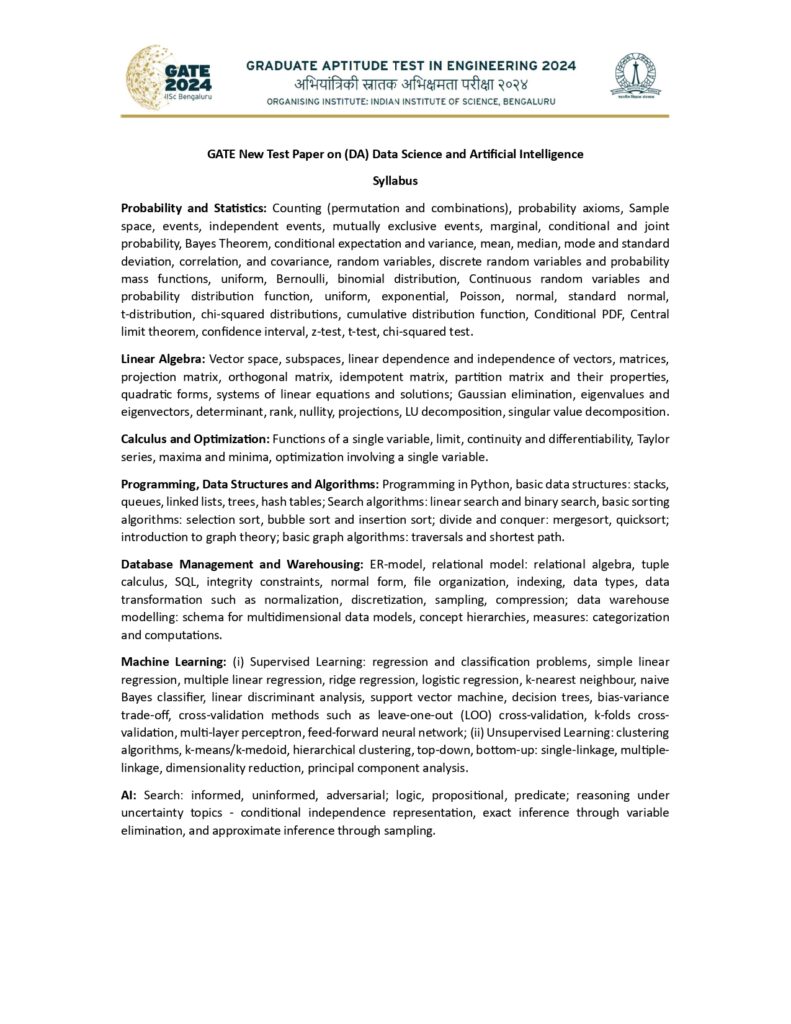Official GATE Data Science and AI Syllabus
Table of Contents

Get detailed explanation about GATE DA Syllabus
Probability and Statistics: GATE Data Science and AI Syllabus
- Permutations and Combinations: Counting techniques used to calculate the number of possible outcomes.
- Probability Axioms: Fundamental rules governing probabilities, such as the addition rule and multiplication rule.
- Sample Space and Events: Sample space represents all possible outcomes, while events are subsets of the sample space.
- Independent Events: Events that do not influence each other’s occurrence.
- Mutually Exclusive Events: Events that cannot occur simultaneously.
- Marginal, Conditional, and Joint Probability: Different ways to calculate probabilities based on given conditions.
- Bayes Theorem: A rule to revise probabilities based on new evidence.
- Conditional Expectation and Variance: Expected value and variance under certain conditions.
- Descriptive Statistics: Measures such as mean, median, mode, and standard deviation.
- Correlation and Covariance: Measures of relationship between variables.
- Random Variables and Distributions: Variables with uncertain outcomes, and their associated distributions (e.g., binomial, normal).
- Central Limit Theorem: Describes the distribution of sample means.
Linear Algebra: GATE Data Science and AI Syllabus
- Vector Spaces: Mathematical structures containing vectors that can be added and scaled.
- Matrices: Rectangular arrays of numbers.
- Systems of Linear Equations: Sets of equations where each equation is linear.
- Eigenvalues and Eigenvectors: Special vectors and scalars associated with square matrices.
- Determinants: Scalar values associated with square matrices.
- Rank and Nullity: Properties of matrices related to their linear transformations.
- Matrix Decompositions: Breaking down matrices into simpler forms (e.g., LU decomposition, singular value decomposition).
Calculus and Optimization: GATE Data Science and AI Syllabus
- Limits and Continuity: Fundamental concepts for understanding functions.
- Differentiation and Integration: Techniques for finding derivatives and integrals.
- Optimization: Finding maximum or minimum values of functions.
Programming, Data Structures, and Algorithms: GATE Data Science and AI Syllabus
- Programming in Python: Using Python programming language for implementing algorithms.
- Data Structures: Organized formats for storing and manipulating data (e.g., arrays, linked lists, trees).
- Algorithms: Step-by-step procedures for solving problems (e.g., searching, sorting).
- Graph Theory: Study of graphs and their properties.
- Database Management: Organizing and manipulating data in databases using SQL.
Machine Learning: GATE Data Science and AI Syllabus
- Supervised Learning: Learning from labeled data (e.g., regression, classification).
- Unsupervised Learning: Learning from unlabeled data (e.g., clustering, dimensionality reduction).
- AI: Various techniques for problem-solving and decision-making (e.g., search algorithms, logic, reasoning).
Artificial Intelligence: GATE Data Science and AI Syllabus
- Search Algorithms: Strategies for finding solutions in large search spaces.
- Logic: Formal systems for representing knowledge and reasoning.
- Reasoning Under Uncertainty: Techniques for dealing with uncertain information.
GATE DA Subject wise syllabus:
- GATE DA Linear Algebra Syllabus
- GATE DA Calculus and Optimization Syllabus
- GATE DA Probability and Statistics Syllabus
- GATE DA Python Programming Data Structures and Algorithms Syllabus
- GATE DA DBMS and Warehousing Syllabus
- GATE DA Machine Learning
- GATE DA Artificial Intelligence Syllabus
Prepare effectively for the GATE Data Science and AI exam by visiting piyushwairale.com. Piyush Wairale offers a comprehensive GATE DA course bundled with a test series for only 1500 Rs. With a track record of success, Piyush Wairale’s GATE DA 2024 results speak for themselves: 4 students ranked in the top 100 and over 15 students secured positions in the top 500. Gain access to high-quality study materials, expert guidance, and practice tests to enhance your preparation and maximize your chances of success in the exam. Don’t miss this opportunity to excel in the GATE Data Science and AI exam with Piyush Wairale’s proven coaching. Visit piyushwairale.com today to kickstart your journey towards achieving your goals.


Leave a comment